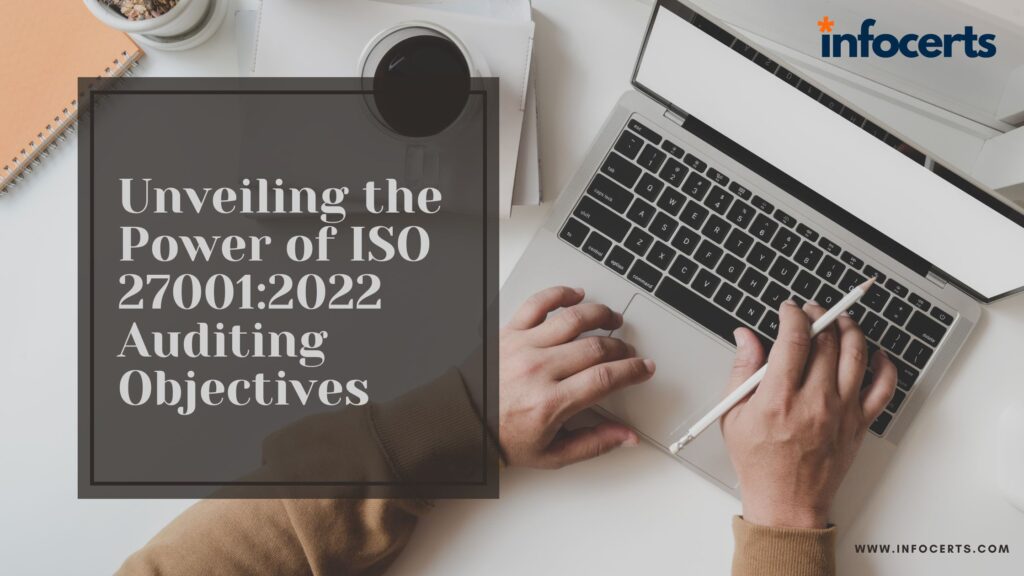Ensuring robust information security is crucial in today’s digital age. For organizations aiming to safeguard their data, the ISO 27001:2022 standard provides a comprehensive framework. This blog delves into the core auditing objectives of ISO 27001:2022, ensuring your management system aligns with the best practices in information security.
Key Auditing Objectives
ISO 27001:2022 lays out three fundamental auditing objectives:
- Conformance to ISO 27001 Requirements
- Evaluation of the Management System’s Ability to Meet Objectives
- Assessment of the Management System’s Effectiveness
1. Conformance to ISO 27001 Requirements
Ensuring your management system aligns with the requirements of ISO 27001 is critical. This involves a detailed review to confirm that all processes, controls, and policies adhere to the standard.
Key Points:
- Documentation Review: Check if all necessary documents and records are maintained as per ISO 27001 guidelines.
- Policy Alignment: Ensure the organization’s information security policies reflect the requirements of the standard.
- Process Verification: Verify that the implemented processes comply with ISO 27001 specifications.
| ISO 27001 Requirement | Objective | Verification Method |
|---|---|---|
| Documentation | Ensure all necessary records are kept | Review documents and records |
| Policy | Align policies with ISO standards | Cross-check policies |
| Process | Implement compliant processes | Process audits and assessments |
2. Evaluation of the Management System’s Ability to Meet Objectives
The management system should effectively help the organization achieve its stated objectives. This evaluation focuses on the system’s capability to manage risks and support the organization’s goals.
Key Points:
- Risk Management: Assess how well the system identifies, evaluates, and mitigates risks.
- Objective Achievement: Evaluate whether the management system helps in meeting the organizational goals.
- Performance Metrics: Check if there are clear metrics to measure the performance and success of the management system.
Our company, INFOCERTS, offers comprehensive courses on ISO 27001:2022. Contact us at +91 70455 40400 to enroll and enhance your understanding and implementation skills.
3. Assessment of the Management System’s Effectiveness
The ultimate goal of the audit is to assess how effective the management system is in protecting the organization’s information assets. This includes evaluating the performance of controls and the overall security posture.
Key Points:
- Control Performance: Assess the effectiveness of implemented controls in mitigating risks.
- Continuous Improvement: Evaluate mechanisms for continuous improvement in the management system.
- Incident Response: Review the organization’s ability to respond to and manage security incidents.
| Effectiveness Criteria | Objective | Evaluation Method |
|---|---|---|
| Control Performance | Ensure controls mitigate risks effectively | Control testing and performance review |
| Continuous Improvement | Foster ongoing enhancements | Review improvement logs and actions |
| Incident Response | Efficiently manage security incidents | Incident handling procedures review |
Conclusion
Auditing your management system against ISO 27001:2022 objectives is crucial for maintaining robust information security. Ensuring conformance, Evaluating System capabilities, and assessing effectiveness are key steps in safeguarding your organization’s data.
For more detailed insights and professional training on ISO 27001:2022, click here to explore our courses. Our experts at INFOCERTS are ready to help you achieve excellence in information security management. Contact us today at +91 70455 40400 to enroll and elevate your skills.
By focusing on these auditing objectives, organizations can not only ensure compliance but also enhance their overall security posture, safeguarding against potential threats in an ever-evolving digital landscape.

